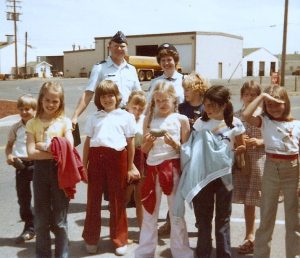There was a YA novel that my mother had a cherished copy of – likely a first edition, because I vividly remember the dust jacket painting in the 1930s commercial style – a pair of teenagers on horseback, in a landscape that was very clearly California’s back country. There was a gnarled live oak tree behind them, some ranges of green trees that looked like a citrus orchard, and a range of purple mountains on the horizon. Mom had her own bookplate pasted into the inside cover of that copy – a black and white picture of a cowboy on a horse, swinging a lariat. That book gravitated from Granny Jessie’s house through three or four houses where we all lived, until it finally was destroyed in the 2003 Paradise Mountain fire, which burned Mom and Dad’s retirement home to the ground, along with just about all the inherited memorabilia and books from both sides of the family. I had a go at replacing some of the books which had been lost, but I was stymied for years at remembering the name and author. And things happened: Dad passed away in 2010, and Mom fell catastrophically some years after that. She has been paralyzed from the shoulders down ever since. She had to go to a nursing home, and then to my sister’s home. The retirement house had to be sold, all the furniture and fittings dispersed among the family, sold at an estate sale or given away … which is irrelevant to this essay, but for the fact that that book was the one which I never got around to replacing.
I couldn’t remember the title of that book, or the author, although I could remember such things as the name of the protagonist, his friends, the general plot, and the fact that there was a map of the relevant area in the book. His name was Billy, his cousin from the big city was Penny, his horse was named Querida, and the family name was Deane – they lived on a ranch in the back country of Northern San Diego County, as it was then. He had a good friend in a boy from the local Indian reservation, and the plot involved dangerous smuggling from over the border, and an earth tremor which had somehow rerouted the natural springs which watered the Deane ranch. Such is my erratic memory – one which Mom once compared to an untidy filing cabinet, full of curious odds, ends and strange but true facts, but all jumbled together in no particular organized order. Now and again, I tried out a search using these bare factoids, but nothing ever turned up, until I threw out the question to the regulars at the Sunday morning book thread at Ace of Spades HQ – and yay – a miracle!
A regular reader there applied those various sketchy details out to a better search engine and came up with the title and author name! Hurrah! The book was titled The Singing Cave, by one Margaret Leighton Carver, who apparently had a good long run as a writer of young adult historical fiction and biographies for about twenty years. The Singing Cave, originally released in 1945 was one of her first popular novels. She lived in California, which accounted for the local west-coast color. I found a reasonably-priced copy at Abe Books and ordered it at once. Not only was there a certain sentimental value for me – but that in many ways the plot and setting was in a California long-gone, and even fading in memory as those who recall it as children and teenagers in the 1930s and 40ies pass from this mortal coil. There once was a California of ranches and small farms, orchards of citrus trees surrounded by windbreaks of eucalyptus, olive trees and grapes for raisins and wine, dairy farms, plantations of olive trees, almonds and other specialty crops, interspersed with small towns of comfortable early 20th century houses, modest suburbs and the occasional grand estate in Pasadena, Santa Barbera, or San Marino, established by a scattering of old wealth who loved the mild climate. I was around to see the last few bits of pre-WWII California, which my parents remembered from their own growing up, before it was all swamped in miles and miles of development sprawl and strangled by new freeways. The California that my parents knew and loved, and that I remember most fondly is all but gone – the world described in The Singing Cave is saved from the wreck like a bit of flotsam, a window into a previous time, and a reflection of the way that things used to be.









Recent Comments